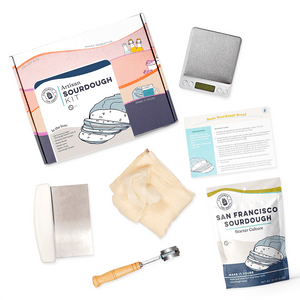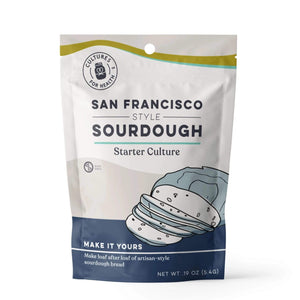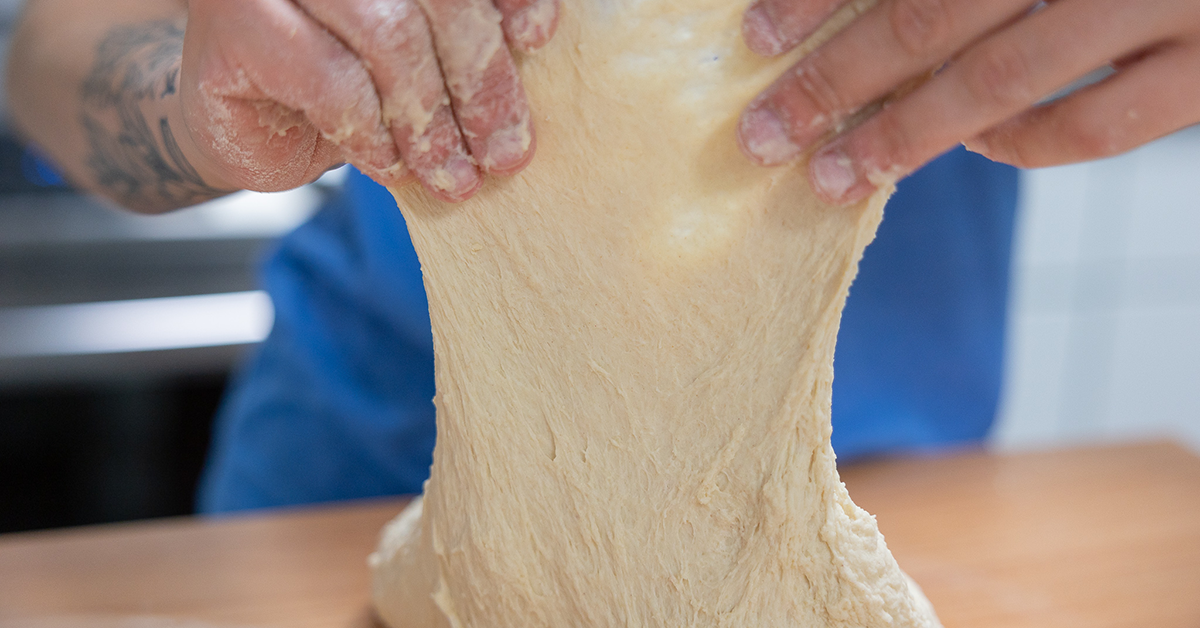
This basic sourdough bread recipe is a great one for beginners or those who want a simple sandwich bread for everyday use. This recipe can be used to make a basic loaf of sandwich bread or artesian-style bread. With a mild tangy flavor and a chewy texture, this loaf combines the best parts of artisanal sourdough bread without making it unapproachable either in technique or in flavor.
30 minutes
30 minutes
1 loaf
INGREDIENTS AND EQUIPMENT AVAILABLE AT CULTURES FOR HEALTH
Artisan Sourdough Bread Kit

Artisan Sourdough Bread Kit
$44.99
This sourdough bread kit contains everything you need to get started making beautiful, tasty, artisan-style sourdough bread at home!
Equipment in the sourdough bread starter kit may appear different than pictured.
Sourdough Starter: San Francisco Style

Sourdough Starter Culture: San Francisco Style
$13.99
Our Sourdough Starter Culture sets you up for bread-making success!
The Sourdough Starter is an heirloom culture in a San Francisco style, meaning you'll make endless bread dough all from one starter! Just add water and white flour.
One of the premier sourdough starters for sale online, Cultures for Health's San Francisco style starter has proven itself very versatile and hardy, happily thriving in a variety of environments to continually produce chewy, crusty, tangy sourdough loaves.
Sourdough is perfect for beginners. It is a very forgiving culture and one of the easiest to work with!
This easy sourdough recipe serves as the base for a whole host of sourdough bread options. Beginning with a sourdough starter, our basic sourdough bread recipe can be baked in a bread pan for a delicious sandwich loaf or in a dutch oven for a crustier artesian-style sourdough loaf.
Introduction to Sourdough Bread
Any sourdough bread starts with a starter. Instead of using store bought yeast like a normal loaf of bread, sourdough bread relies on a living culture of yeasts that you grow at home. We love the extra tang of our San Francisco Sourdough Starter, but at it's heart, a sourdough starter is just your own colony of wild yeast and each colony can have it own flavor. Giving this starter some time to digest and leaven your dough will produce the sour flavor that's the calling card of sourdough bread.
We want to share our love for Sourdough bread with the world and show them that it’s not as hard as it seems. Download our Sourdough Recipe book with tips and tricks for you to make the perfect loaf of Sourdough every time!
INGREDIENTS NEEDED FOR YOUR SOURDOUGH BREAD RECIPE WITH STARTER:
- 2 1/3 cups fresh sourdough starter
- 3 1/3 cup flour
- 1-1 1/2 cup water
- Scant Tbsp. salt
Sourdough bread has been praised for its health benefits as compared to standard bread. It's packed with prebiotics that are good for your gut health, and its slow fermentation process gives the bread a lower glycemic index. If you're interested in learning more about the health benefits of sourdough bread, you can check out our article on The Health Benefits of Fermented Foods.

INSTRUCTIONS FOR SOURDOUGH BREAD RECIPE:
- Mix sourdough starter, flour, and salt together. Use enough water to make bread dough. A moist dough is preferable to a dry dough. Because of difference in hydration and humidity, it's difficult to give and exact amount of water to use, but as you make a few loaves, you'll get a feel for when the sourdough feels ready to work with.
- Knead dough until it passes the “window pane test”: a small piece of dough will stretch between four fingers without breaking thin enough to allow light to pass through. This can be done via a whole bunch of methods, both by hand and with a stand mixer. One common method for kneading sourdough bread is to grab the dough, pull it and fold it over, rotate the sourdough 90 degrees and do it again. Repeating this folding will help build the gluten strands that will produce the light and airy structure as the dough rises.
- Shape the dough into a loaf. Place in a pan or proofing basket, or on a board. Rub a little oil on the top surface of the dough and cover lightly with a towel or plastic wrap. Allow the dough to rise for 4-24 hours. If desired, a short (4-12 hours) proofing period can be used and the dough can be punched down, reshaped, and allowed to rise a second time, but a second proofing period is not required.
- Slice an X shape in the top of the loaf with a very sharp knife or razor blade. As the bread bakes, the air inside will expand, giving the sourdough some additional loft. However, that expansion can split the bread. By using a razor to provide a place for that expansion, we can minimize the risk of the bread doing something unexpected as it cooks.
- Bake at 400°F until the internal temperature reaches 210°F. (Use a meat thermometer inserted into the bottom or side of the loaf.) Bake 30-60 minutes (depending on loaf size). Cool before slicing. Yes, let it cool before slicing. I know, everyone wants fresh, warm sourdough, but the bread will be better if you let it cool first!

TWEAK YOUR SOURDOUGH BREAD RECIPE
Now that you've made a loaf, one thing you'll notice is that this recipe is more of an outline than an exact recipe. If you use more water and make a wetter dough, you'll get a little different texture. If you let it proof longer, that sour flavor will intensify. Cooking in a dutch oven will result is a thicker crust. And there are a dozen other tweaks you can make to make the sourdough recipe your own.
Once you've created a bread that you love, you'll be able to recreate it and share it with friends and family. There's nothing quite like sharing a homemade sourdough bread with friends who recognize and love the unique flavor that only your sourdough bread brings to the table!
START MAKING EASY SOURDOUGH BREAD
Now that you have the best basic sourdough bread recipe, it’s time to start making some at home, and Cultures for Health is here to supply you with everything you need. We have the largest selection of fermentation and culture products and even have all of the tools you’ll need in making homemade sourdough bread and get our sourdough cultures for sale .
Check out our sourdough ebook, full of recipes and tips to take your sourdough baking to the next level today!

For beginners, the best option for making sourdough bread at home is our amazing Artisan Sourdough Kit. This starter kit comes with everything you need to start making sourdough bread at home including:
- 1 x San Francisco Style Sourdough Starter
- 1 x Bread Lame (Scorer)
- 1 x Baker’s Scale
- 1 x Steel Dough Scraper
- 1 x Butter Muslin
On top of all of that, this kit comes with multiple recipe cards to try other ways to make sourdough bread at home.
Click here to check out our Artisan Sourdough Kit now!

Do you want to start making your delicious Sourdough bread at home? Download our Sourdough Guide and Recipe Book today!
Sourdough Success
Remember, practice makes perfect. The more you bake, the better your loaves will become. So, don't be afraid to dive into the world of sourdough and try out our easy sourdough bread recipe. The delicious, tangy results will surely be worth it.
One common question among new sourdough bakers is "How long should I let my dough ferment?" The answer can vary, but a good rule of thumb is to let your dough ferment at room temperature for 12-15 hours. This time allows the yeast and bacteria in the starter to fully ferment the dough, creating the distinct sourdough flavor.
When it comes to storing your sourdough starter, make sure to keep it in a glass or plastic container with a loose-fitting lid. This will allow the starter to breathe while also keeping it contained. It's also essential to feed your starter regularly to keep it active and ready for your next sourdough bread recipe.














